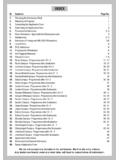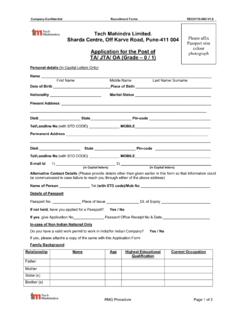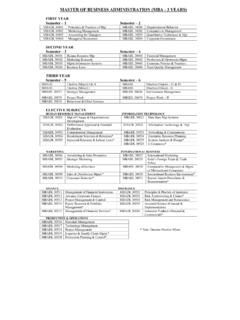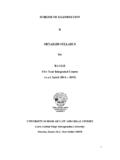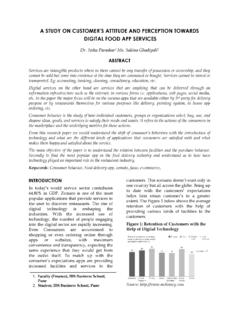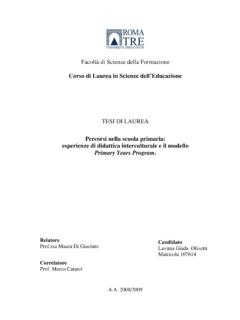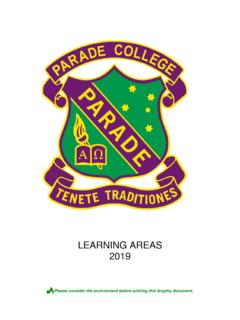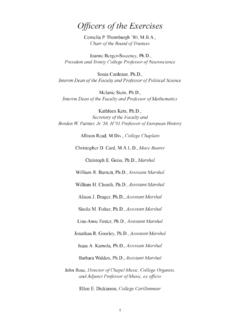Transcription of Frequently Asked Questions What is International ...
1 Frequently Asked Questions what is International baccalaureate organization ? Founded in 1968, the International baccalaureate organization (IBO) is a non-profit educational organization based in Geneva, Switzerland. The IBO is an International organization , not associated with any particular country and free of any national, political or educational agendas. The International baccalaureate (IB) offers high quality programs of International education to a worldwide community of schools. The three programs for students aged 3 to 19 help develop the intellectual, personal, emotional and social skills to live, learn and work in a rapidly globalizing world. There are more than 5,96,000 IB students at 2,218 schools in 125 countries. The three programs are: PYP: The Primary Years Program (Kindergarten to Class 5). MYP: The Middle Years Program (Class 6 to Class 10).
2 DP: The Diploma Program (Class 11 to Class 12). How is IB different from any other board of education? Can my child cope up with IB? The IB program is practical and application-based. It has a broader spectrum of subjects that lead to all-round development. IB examinations test students' knowledge, not their memory and speed. There are no externally evaluated examinations till the Middle Years Program (Class 10). The focus of the IB pedagogy is on 'how to learn' rather than ' what to learn'. The purpose of the IB is to produce global citizens, but it can be well-integrated with the local curriculum. Hindi can be offered as a second language in the IB Diploma Program. The IB curriculum is more challenging than educational boards like the CBSE and ICSE. The challenge is in the quality of assignments, not in the amount of work assigned.
3 what are IB World Schools? Schools recognized by the International baccalaureate organization and offering the IB curriculum are known as IB World Schools. There are just 40 IB World Schools in all over India. The list of authorized schools is available on the IBO website what is the International baccalaureate Diploma Program-IBDP? The IBDP is a comprehensive two-year course and is a rigorous academic program. It is designed as a pre-university program for students aged 16 to 19. There are a wide range of courses designed to meet the interests and requirements of different students. In addition to the courses offered, it is unique because only the IBDP includes the Creativity, Action and Service (CAS) program, the Extended Essay and the Theory of Knowledge course. Together these offer IBDP students experiences and skills they will not find in any other program.
4 what are the subjects in DP? DP students choose one subject from each of the following six 'Subject Groups': Group 1: First Language (English) Group 2: Second Language (French, German ab initio, Hindi, etc) Group3: Individuals and Societies (History, Economics, Business and Management, etc) Group 4: Sciences (Biology, Chemistry, Physics and Environmental Systems) Group 5: Mathematics and Computer Science Group 6: Electives (either Visual Arts or a second subject from Groups 3, 4 or 5) In addition, all DP students must study a two-year course called Theory of Knowledge (TOK); work to produce on Extended Essay (EE); and engage in Creativity, Action, and Service (CAS). what is the difference between higher level and standard level IB subjects? There is more breadth and depth in higher level subjects. The content in HL subjects requires 240 teaching hours versus 150 hours for standard level.
5 Generally higher level subjects are more rigorous than Standard level. Which IB subjects should a student register for? The choice of IB subjects should be according to: 1) Areas of strength 2) Future career 3) University requirements for each country- what are TOK, EE and CAS? Theory of Knowledge is an essay of 1,200-1,600 words written on a given title (from a choice of ten), followed by a ten-minute presentation of the essay by the student in class. The Extended Essay is an original independent research leading a DP student to produce a comprehensible written piece of 3,500-4,000 words in any chosen subject and title. Under Creative, Action and Service (CAS), each DP student must complete at least 150 hours of work spread over one-and-a-half years, engaging in some form of creativity, participating in sport or other physical action, and doing social service.
6 Can a student do the IB Diploma after completing his/ her schooling through a different board? Although the PYP, MYP and DP form a continuous sequence, each can be offered independently too. A student can join the IB Diploma Program after completing the grade 10 level qualifications from CBSE, ICSE or any other State Board .The Diploma program is equivalent to 10+2 level qualification through CBSE. Is the IB recognized in India and worldwide? The rigor and high standards of the IBDP ensure that colleges and universities around the world recognize the IB Diploma as a superior academic program and a strong university - entry credential. The Association of Indian Universities (AIU) rates the IB Diploma at par with Class 12 CBSE, ICSE, NIOS or State Boards. Many educational institutions and colleges have published their policies and entry criteria for IB students on their websites.
7 For example, Delhi University colleges have specified their conditions for entry of IB students. The information is also available on the IBO website Universities in over 110 countries recognize the IB Diploma and it will allow entrance to the most competitive universities around the world. The university admission authorities recognize the academic rigor of the IBDP, and value the extra parts of the Diploma, such as TOK, CAS and the Extended Essay. Most universities in Europe require the full Diploma as a qualification for entry. It is considered to be worth four and a half A Level. Higher Level Courses are broadly equal to British A-Level courses. Higher Level courses are considered equivalent to American Advanced Placement (AP) courses Successful IB Diploma students may be offered credit (particularly for Higher Level courses and TOK) for first year university courses in Canadian and American Universities overseas.
8 Why should I select IB for my child? 1. The IB Diploma has earned universal reputation for rigorous assessment, giving students access to the top colleges and universities in India and the world. IB is fast becoming the program of choice for Indian students preparing to pursue higher education abroad. 2. The IB curriculum equips students with the tools needed to succeed in higher education, such as self-confidence, preparedness, research skills, organizational skills and being actively engaged in self learning. 3. Some universities even offer scholarships to IB diploma holders. 4. University admissions around the world are getting competitive by the day. Admission officers are increasingly looking for other evidence that a student will succeed in the university - such as exposure to quality curriculum, research abilities, an International outlook and social service - all enhanced by the IBDP.
9 what extra-curricular and sports facilities are available on campus? The sports facilities available are varied and numerous, so there should be something to suit everyone. Activities include the traditional team sports such as Soccer, Cricket, Hockey, Netball, Volleyball and Basketball as well as Badminton, Table-tennis, Carom, Trampoline, Chess, Tennis, Aerobics and Skating. Fixtures take place regularly against local schools and other International Schools in the region. Nearly all of the activities are open to both sexes and many run all the year round. In addition excursions and trekking expeditions are organised. How is the IB curriculum reviewed and maintained? Universities can be confident that this is a rigorous and transparent process. All curriculum documents are reviewed on a seven-year cycle.
10 This cycle is not fixed and if significant change occurs in a body of knowledge (for example, computer science), then changes will be introduced more quickly. The cycle allows for: Worldwide research by curriculum personnel Design of curriculum models through consultation with practitioners in IB World Schools Presentation of draft documents to the Diploma Program committee and IB World Schools Analysis of feedback before final publishing, training of teachers and then teaching and examining of the new curriculum. At the end of the two-year program, students are assessed both internally and externally in ways that measure individual performance against stated objectives for each subject. How are IB students assessed in the IBDP Program? There are two kinds of IB assessments: External and Internal.
